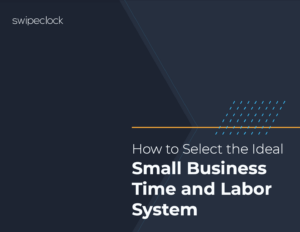The Employer’s Guide to Federal & State Meal/Rest Break Laws [See all 50 State Laws Here]

Updated January 23, 2024
Under the federal Fair Labor Standards Act (FLSA), employers are not required to provide meal or rest break periods to employees. However, some states do have laws in effect dictating when and how often an employee should receive a break, as well as whether these breaks are paid or unpaid. In this article, we discuss meals and rest break laws state by state.
First, some background:
Breaks Less Than 20 Minutes Should be Paid Per Federal Law
When employers provide employees rest breaks that last 20 minutes or less, federal law requires that those breaks be paid. Additionally, that time must be used in the total number of hours worked during a workweek to determine if the employee worked overtime.
Breaks 30 Minutes or Longer Can be Unpaid in Most Circumstances
By contrast, meal breaks that last 30 minutes or more can typically be unpaid if the employee is relieved of all work duties.
The New York Times reports that nearly two-thirds of American workers eat lunch at their desks. If an employee is not relieved of work duties (i.e., is eating at their desk while working), they should not be required to take an unpaid meal break.
Does Your Timekeeping System Automatically Clock Employees Out for Lunch?
Unfortunately, a timekeeping practice that automatically clocks out an employee for lunch can create problems for employers. If your time and attendance system automatically clocks employees out for lunch, even those who are still working, that puts you at risk.
It is also a problem if your employee does take a lunch break, but continues to be responsible for work-related tasks. In this situation, employees must be paid for their meal breaks.
Not tracking breaks or lunch properly is a common off-the-clock work violation and can be very costly. It puts you at risk for a lawsuit, and DOL penalties. All of these affect your bottom line and hurt employee relations. If you are still using an old-fashioned punch clock, considering upgrading to a clock that tracks breaks.
In states like California that require meal and rest breaks, it becomes extremely expensive for employers who do not follow break laws.
Make Sure Employees and Managers Know the Laws
It’s crucial to make sure that employees and managers understand break expectations. However, some employees will still feel pressure to clock out and continue to work. Therefore, it is just as important to make sure that employees and managers understand that properly tracking work time is just as important.
Every state has varying employer requirements. Some states have expansive break requirements, while others are minimal.
Employers who use time and attendance software can properly track employee breaks per state law. These employers can also provide longer unpaid breaks.
Alabama Meal & Rest Breaks
Alabama only has break requirements for minor employees. Employers must give employees ages 14 and 15 a 30-minute rest during a shift of 5 hours or more.
Any break that is less than 30 minutes isn’t considered an interruption from work.
Alaska Meal & Rest Breaks
Alaska only has break requirements for minor employees. An employee 17 years or younger who works 5 consecutive hours and will continue to work must be allowed at least a 30-minute unpaid meal break. The break must occur after the minor’s first hour and a half of work and before the start of the last hour of work. Breaks 20 minutes or less may be unpaid.
Alaska Department of Labor & Workforce Development
Arizona Meal & Rest Breaks
Arizona does not require private employers to provide meal or rest breaks to employees. Federal law applies.
Industrial Commission of Arizona
Arkansas Meal & Rest Breaks
Arkansas does not require either rest or meal breaks for employees over the age of 16, with the exception of lactating mothers. If the employee is relieved of working, then the employer does not have to pay for the break time. However, the employee must be free to leave their workstation. Rest breaks of 20 minutes or less counts as time worked.
The lactation break law requires employers to provide reasonable unpaid break time throughout the workday to lactating employees. They also must have a private place to express breast milk near their work area that is not a restroom stall.
Those under the age of 16 who work in the entertainment industry must be given rest breaks.
Arkansas Department of Labor and Licensing
California Meal & Rest Breaks
California law requires multiple breaks for employees. These breaks include meal breaks, rest and recovery breaks, and breaks for employees paid on commission. State law also requires a day of rest break. Plus, individual California cities have additional rest break laws.
California Meal Breaks
In California, employers must provide 30-minute unpaid breaks to nonexempt employees who work at least 5 hours per day. If the employee works 6 or fewer hours, then the employer and employee can agree to waive the break if both parties provide written consent.
When an employee works 10 hours in a day, the employer must provide a second 30-minute unpaid meal break. If the total workday is less than 12 hours, then the employee can waive the second meal break. This requires written mutual consent of both the employer and the employee.

Employers Who Fail to Provide Breaks Must Pay for Additional Work Time
If an employer fails to provide the required meal periods, then they must pay the employee an additional hour of pay for each workday without a break. The pay must be the employee’s regular rate.
This means that if a $15/hr employee works 7 hours and misses their meal break, they must be paid an extra $15 for the missed break.
Employees who work in healthcare and work more than 8 hours can voluntarily waive one of their two meal breaks. The waiver must be a written document voluntarily signed by both the employee and the employer. In addition, the employee can revoke the waiver at any time with one day written notice. While the waiver is in effect the employer must pay the employee for all work time.
- 5+ hours – 30-minute unpaid break
- 6 hours – Break can be waived by mutual consent
- 10+ hours – Two 30 minute breaks in the shift
- 12 hours – The second break can be waived by mutual consent
- Healthcare employees can waive their second meal break if working more than 8 hours
The California Supreme Court has issued clarifications regarding California meal and break law. For example, although an employer is obligated to provide meal breaks and to relieve employees of work duties, the employer is not obligated to ensure no work is done.
Additionally, any work done by an employee during a meal break, who has been relieved of work, does not create a liability for premium pay. Remember that California requires premium pay if the employer denies meal breaks.
Thus, if an employee is relieved of work duties for a meal break and the employee still does work, then the employer is not required to pay the premium. However, the employer could still be responsible for paying the employee at their regular rate of pay. The employer is only liable to pay when they knew or reasonably should have known the employee was still working during the meal break.
Further, meal breaks should fall no later than 5 hours into a shift, but do not have to be scheduled at 5-hour increments.
California Rest Breaks
In California, employers must allow nonexempt employees to take a rest period. The rest must be in the middle of the shift, if possible. Employees must get 10 consecutive minutes for a break every 4 hours. If the employee works a fraction of a shift that is 2 hours or more, then they must receive a break.
Any employee who works 3 ½ hours or more must receive a break. Rest breaks are counted as work and the employee must be paid for the rest time. Even though rest periods are paid time, employers cannot require the employee to stay on work premises. The employee must be relieved of all work-related activities during the break. On-call rest periods are generally prohibited.
It’s important to note that rest periods must be 10 minutes. This means that the rest period starts when the employee reaches the rest period. Employers must provide a break area that isn’t a restroom.
Additionally, employees working in extreme weather conditions are required to receive an additional 5-minute recovery period in a protected environment.
California Commission Employee Breaks
Employers must provide commission employees with a separate pay schedule for rest periods. As part of an employee’s commission agreement, the commission-based compensation plan must include a separate pay for rest periods. Otherwise, the plan doesn’t comply with state law.
If employers track hourly work by commission employees and pay an hourly wage that is an advance on the commission earned later, this is in violation of the law if rest periods are part of the “advance of wages.” paid.
California Day of Rest Requirements
In California, employees are entitled to one (1) day of rest every seven (7) days. The California Supreme Court has defined this as one day every work week.
An exception to this rule is for employees who do not work more than 30 hours in the week and no more than 6 hours in a single day.
The Day of Rest requirements allows employees to work longer than 6 consecutive days as long as the consecutive days roll over into another work week.
San Francisco Lactation Accommodation
Mothers must be allowed a “reasonable time” to express breast milk. The break time must run concurrently to any other rest breaks to which the employees are entitled. Any extra time that the employee needs does not have to be paid time.
Employers must provide a lactation location close to the employee’s work area. That area must be separate from the restrooms. The area must include a refrigerator and a sink with running water. It can be in the same location as the employee’s work area and must be free from intrusion from coworkers and the public.
Supreme Court Rules on Employer Meal and Rest Breaks
California Department of Industrial Relations
WorkforceHub has customizable meal and break tracking. Try it for free today.
Colorado Meal & Rest Breaks
Colorado requires that employers provide at least a 30-minute meal break to employees who work 5 hours or more. The meal break can be unpaid if the employee is relieved of all work-related activities. Employees must be allowed to pursue personal activities during this time.
If the employee eats their meal while being responsible for any work activities, then the employer must pay the employee for the break.
Rest Breaks
Employers in certain industries must allow a 10-minute break for every 4 hours worked. If possible, the rest breaks should be during the middle of the employee’s shift. These industries include:
- Retail and Service Occupations
- Occupations with Food and Beverages
- Health and Medical Occupations
- Commercial Support Services
In Colorado, certain employees are exempt from rest break requirements. Administrative, executive, supervisory, professional and outside sales employees are exempt from rest break laws. In addition, property managers, interstate drivers, and driver helpers are exempt.
Colorado Department of Labor and Employment
Connecticut Meal & Rest Breaks
Employers must provide non-exempt employees meal breaks of no less than 30 minutes if they have worked for 7½ or more consecutive hours. Exemptions apply in certain circumstances.
Connecticut does not have laws governing shorter break periods, so federal law applies.
Connecticut Department of Labor
Delaware Meal & Rest Breaks
Delaware requires at least 30 minutes for a meal break any time an employee works at least 7.5 hours in a day.
The meal break must happen after at least the first 2 hours of the shift and before the final 2 hours of the shift.
Meal breaks can be unpaid time, but the employer must relieve the employee of all work activities and the time must be uninterrupted.
There are several exceptions to Delaware law. Under these exceptions, employers must allow employees to eat at their workstations and to use the restrooms as needed.
Exceptions to Delaware Break Laws
- Compliance with the break requirement would adversely affect public safety.
- Only the employee can perform the duties of the position.
- An employer has 5 or fewer employees at one location during the shift.
- Urgent conditions require employees to be available to handle operations.
- A collective bargaining agreement is in place.
- An employee works for a local school board, directly with children.
Any employee under the age of 18 cannot be allowed to work for more than 5 hours continually without at least a 30-minute break.
District of Columbia Meal, Rest, and Nursing Mother Breaks
Washington, D.C. does not require specific meal or break periods, with the exception of nursing mothers. Employers are required to provide a reasonable break time to mothers to express breast milk. This break time can coincide with other breaks provided and can be paid or unpaid. Employers must make efforts to provide a sanitary room in close proximity for the employee to express milk. This room cannot be a toilet stall or restroom.
Employers can be excused from this requirement if doing so would cause an undue hardship on the employer’s operations.
District of Columbia Department of Employment Services
Florida Meal & Rest Breaks
In Florida, minor employees (under the age of 18) cannot work more than 4 consecutive hours without at least a 30-minute break. However, some exceptions may apply.

A barista serves a customer in Miami, Florida. Photo by Jason Briscoe on Unsplash.
Florida Department of Commerce
Georgia Meal, Rest & Nursing Mother Breaks
Georgia law doesn’t require specific meal or rest breaks. However, it does require a break for nursing mothers and an accommodation for religious beliefs.
Employers must provide nursing mothers with unpaid breaks to express breast milk. The employer must make reasonable accommodations to provide a room, which is not a toilet stall, to express milk privately. The break time can run concurrently with other breaks.
If providing breaks to a nursing mother would unduly disrupt the operations of the employer, then the employer is not required to provide the break.

A performer climbs a coconut palm tree at the Polynesian Cultural Center in Laie, Hawaii. Photo by Michal Pechardo on Unsplash.
Hawaii Meal, Rest & Nursing Breaks
Hawaii’s only break laws pertain to nursing mothers and employees ages 14 and 15. Federal law applies to workers ages 16 and over.
Employers must provide at least a 30-minute break for 14- and 15-year old employees who work 5+ consecutive hours. If the employee is completely relieved of all duties, it can be unpaid.
Employers in Hawaii must provide reasonable break time for nursing mothers to express milk for the child’s first year. The employer must provide a break each time the employee needs to express milk, and provide a private location that is not the restroom for the employee to express milk.
Employers must post notice of this law in a conspicuous place and use other means to inform employees of this right. Employers with 20 or fewer employees that can show an undue hardship may be exempt from the requirements of the law.
Hawaii Department of Labor and Industrial Relations
Idaho Meal & Rest Breaks
Idaho does not have any meal or break requirements. Employers in the state follow federal laws.
Illinois Meal & Day of Rest Breaks
Illinois has a meal break requirement and a day of rest requirement.
Employees who work 7.5 hours or more during a shift must be provided with at least 20 minutes of an unpaid meal break. The break cannot be given more than 5 hours after the start of the shift.
Employees under age 16 must receive a break of at least 30 minutes after working 5+ hours.
Employers must provide employees one day of rest in seven (ODRISA). This is defined as 24 consecutive hours of rest in every calendar week.
Exceptions to the Illinois Day of Rest Rules
There are seven exceptions to the day of rest requirement:
- Employees who work fewer than 20 hours a week
- Those needed in the case of a breakdown of machinery or equipment
- Workers needed for an emergency requiring the immediate service of experienced or competent labor to prevent injury to person, damage to property, or suspension of necessary operations.
- Workers in agriculture, coal mining, or canning/processing perishable agricultural products
- Employees who are watchmen (or women) or security guards
- Administrators, executive, and other professional workers.
- Employees working as crew members of uninspected towing vessels operating in waters in or along state boundaries.
Employers can also get permits from the Illinois Department of Labor allowing employees to voluntarily work 7 consecutive days.
Before employers can operate on Sunday, they must post, in a conspicuous place, a schedule listing the employees that are working on Sunday. This list must also designate the day of rest for each employee.
WorkforceHub has customizable meal and break tracking. See how it works with a WorkforceHub demo.
Indiana Meal & Rest Breaks
Indiana does not require meal or rest breaks unless the employee is a minor (under age 18).
Employers must provide minors who work at 6+ consecutive hours with one or two rest periods that total 30 minutes. The required breaks can be taken any point during the shift. Employers must also maintain a record of all paid and unpaid breaks to minor employees.
Iowa Meal & Rest Breaks
Iowa does not require meal breaks or rest breaks except for minor employees under 16 years of age. These employees must be given a 30-minute break if they work 5 hours or more. If the break is 20 minutes or less, it must be paid.
Iowa Workforce Development, Labor Services Division
Kansas Meal & Rest Breaks
Kansas does not have any meal or rest break laws, deferring to federal law.
Kentucky Meal, Rest & Day of Rest Breaks
Kentucky has a meal break, rest break, and day of rest break requirement.
Employers must provide a reasonable (20-30 minutes) lunch period, no earlier than 3 hours from the beginning of the shift and no later than 5 hours after starting the shift.
In addition, employees must be provided with a 10-minute rest break during every 4 hours of work.
Lastly, employees must receive at least 1 day of rest during every calendar week.

Looking for a small business timekeeping solution? Get our free Time & Labor System Buyer’s Guide. We take a deep dive into time collection methods including web clocks, mobile apps and hardware clocks, PTO tracking, meals and breaks settings and overtime alerts. The guide includes three evaluation templates that make it easy to compare functions and features to find the right solution for your business.
Louisiana Meal & Rest Breaks
Employees in Louisiana who are under the age of 18 must be given a 30-minute meal break when working 5 or more consecutive hours. The meal break can be unpaid if it lasts more than 20 minutes and the employee is relieved of all duties.
Louisiana Workforce Commission
Maine Meal & Rest Breaks
In Maine, employees who work 6 or more consecutive hours must be allowed to take a 30-minute consecutive break. If the employee is completely relieved of duties, then the break can be unpaid. However, employers with three (3) or fewer employees on duty at a time are exempt, but must allow frequent shorter breaks.
Additionally, if the employee’s break would be a danger to property, life, public safety, or public health, it is not required. Another exception exists for employees in certain categories:
- Executive, administrative & professional employees with an annual salary of $3,000 the state’s minimum wage
- Certain agricultural employees
- Commission employees
- Taxicab drivers
Maryland Meal, Rest & Retail Employee Breaks
Maryland requires breaks to be provided under the Healthy Retail Employee Act, which applies to retail organizations with at least 50 staff members and operating for 20 or more calendar weeks. In these organizations, employees working shifts that last 6 or more hours must receive a 30-minute meal break. Those working shifts lasting 4 to 6 hours may qualify for 15-minute paid breaks, and 8-hour shifts qualify for two 15-minute paid breaks.
Minors must receive a 30-minute break for every 5 hours worked.
Maryland Department of Labor, Licensing and Regulation
Massachusetts Meal & Rest Breaks
In Massachusetts, most employees must be given a 30-minute break after 6 hours of work.
Furthermore, most employees must be given a day of rest after working 6 consecutive days. The day of rest is defined as 24 hours of rest and must include the interval from 8:00 am to 5:00 pm.
Massachusetts Department of Labor and Workforce Development
Massachusetts Domestic Worker Breaks
Domestic workers have separate break entitlements. These are contained in the Domestic Worker Bill of Rights.
Employers who employ a domestic worker for 40 or more hours a week must provide a rest period of at least 24 consecutive hours each calendar week. They must also provide at least 48 consecutive hours during each calendar month. If possible, that time must allow for religious worship.
Understand Written Agreement Requirements
The domestic worker can voluntarily agree to work on a day of rest. However, this agreement must be in writing. The domestic worker must also be paid an overtime rate for all hours worked on that day.
It’s important to note that the day of rest counts as job-protected leave from employment.
When a domestic worker does not live on premises and works for less than 24 consecutive hours, then the employer must pay the domestic worker for all hours on the premises.
This means that working time includes all the time the worker is required to be on the employer’s premises. It also includes any time before or after the normal shift needed to complete work.
In addition, that time must include meals, breaks, and sleeping periods unless the worker is free to leave the employers premises. If the domestic worker is free to leave and to pursue personal activities and is relieved of all work activities, then that time does not have to be paid.
When domestic workers are required to be on duty for 24 consecutive hours or more, then the employer and worker must agree to exclude a regularly scheduled sleeping schedule of no more than 8 hours from every 24 hours period.
In addition, all breaks, rests, meal periods, and sleeping periods constitute working periods.
Employers Must Notify Employees of their Rights to Rest Periods
Employers who employ a domestic worker for at least 16 hours or more a week must provide employees with information regarding meal and rest breaks.
This includes information about working hours, meal breaks, and time off.
It also includes the provisions for the days of rest, sick days, vacation days, personal days, and holidays. In addition, it must include information about transportation, health insurance, severance, and yearly raises. Lastly, it must include information about whether or not these benefits are paid or reimbursed.
Domestic Workers Bill of Rights
Michigan Meal & Rest Breaks
Michigan requires that minor employees (under age 18) be given at least 30 consecutive minutes or more for every 5 hours worked.
There are no other meal or rest break requirements in Michigan – employers must follow federal law.
Michigan Department of Licensing and Regulatory Affairs
Minnesota Meal, Rest Mother Breaks
Employees in Minnesota must be given a sufficient break to eat a meal. The break may be unpaid if it’s at least 20 minutes long. Employers are also required to provide sufficient time to use the restroom every 4 hours.
Minnesota Nursing Mother Breaks
Employers must provide nursing mothers with an unpaid break each day to express milk for an infant child. The break can run concurrently with any other breaks the employer provides.
Employers must also make reasonable efforts to provide a room or location that is free of a toilet for the employee to express milk. The location should be in close proximity to work and be private. It must also include access to an electrical outlet.
Minnesota Department of Labor and Industry
WorkforceHub has customizable meal and break tracking, making it easy to adhere to the requirements in your state. Request a WorkforceHub demo today.
Mississippi Meal & Rest Breaks
Mississippi has no meal or rest break laws.
Mississippi Department of Health
Missouri Meal & Rest Breaks
Missouri does not require meal or breaks to employees.
Missouri Department of Labor and Industrial Relations
Montana Meal & Rest Breaks
Montana follows federal law regarding meal and rest breaks.
Montana Department of Labor and Industry
Nebraska Meal & Rest Breaks
Employees working in assembling plants, mechanical establishments, and workshops must be provided with one 30-minute break per 8-hour shift.
Nevada Meal & Rest Breaks
Nevada requires breaks for meals, rest, nursing mothers, and domestic workers.
Employers must provide employees with at least a 30-minute meal break for every 8 hours of continuous work.
In addition, employees get a 10-minute rest break for every 4 hours worked in a day. If the employee’s total work time is 3 ½ hours or less, then the employer isn’t obligated to provide a break.

A gondolier at the Venetian Hotel in Las Vegas, Nevada. Photo by Evan Fitzer on Unsplash.
Nevada Rest Break Exceptions
However, there are a few exceptions to meal and rest breaks. For example, if only one employee is at a specific place of employment, then the employer is not obligated to provide a break.
In addition, any employees covered by a collective bargaining agreement fall outside these requirements. Lastly, if the employee has applied and received an exemption from the Nevada Labor Commissioner based on necessity, then the employer is not obligated.
Nevada Nursing Mother Breaks
Nursing mother break laws apply to mothers who have a child under the age of 1 year at home. These employees must have a reasonable break time to express milk. This break can be paid or unpaid. Employers must provide nursing mothers with a place that is not a bathroom and is free from dirt, pollution, and intrusion, and protected from the view of others.
However, if an employer determines that these provisions would cause an undue hardship, then the employer and employee can meet and agree upon a reasonable alternative. If both parties can’t agree, then the employer can require an employee to accept a reasonable alternative. Further, employers can’t retaliate against employees who exert their right to a nursing mother break.
The law doesn’t apply to employers who have less than 50 employees if it would impose a hardship.
Nevada Domestic Worker Breaks
When a domestic worker resides in the household of the employer, then the employee and the employer can agree in writing to exclude certain breaks from the wages of the employee. These breaks include the following provisions:
- Meal breaks of at least 30 minutes
- Sleep breaks if it is no more than 8 hours
- All periods of complete freedom. These periods must be long enough for the domestic worker to make use of it and the worker must be allowed to leave the premises.
If an unpaid break is interrupted by the employer, then the interruptions must be counted as hours worked.
Employees who are required to work or be at a residential facility for 24 hours or more may have a sleep period of up to 8 hours excluded from the worker’s wages. The employer and employee may agree in writing to have the sleep period excluded. Plus, the employer must provide adequate sleeping facilities.
In addition, any interruptions of the sleep period must count as paid working hours. If the interruption causes the sleep break to be less than 5 hours, then the entire sleep period must be paid by the employer.
Domestic workers who work 40 or more hours a week earn a break of 24 consecutive hours per calendar week. Additionally, they get a 48 consecutive hour rest every calendar month.
Nevada Office of the Labor Commissioner
New Mexico Meal & Rest Breaks
In New Mexico, employers must provide a break lasting at least 30 minutes for employees working 8 or more continuous hours. Additionally, employees working at least 4 consecutive hours must receive at least one paid 10-minute break.
New Mexico Department of Workforce Solutions
New Hampshire Meal & Day of Rest Breaks
In New Hampshire, employers must provide a 30-minute meal break to all employees who work 5 hours or more. If it’s feasible for employees to eat during working hours, and the employer allows them to, then a meal break is not required.
Employers who operate on Sundays must post a list of the employees required to work on Sundays and when their alternative day of rest break is during the week. The employer must post the list in the workplace and file it with the New Hampshire Labor Commissioner.
There are some employees who are exempt from these break requirements. This includes:
- Janitors, watchmen (and women), and caretakers
- Employees engaged in the publication and delivery of newspapers
- Farm or personal service employees
- Any labor that is required by an unanticipated emergency
- Employees in retail stores resort areas, inns, theaters, motion picture houses, hotels, and restaurants.
- Workers in telegraph and telephone offices
New Hampshire Department of Labor
New Jersey Meal and Rest Breaks
New Jersey employment law requires that minors (under age 18) must have at least 30 minutes of break time if they work more than 5 continuous hours.
In addition, the state requires reasonable accommodations for nursing mothers. Nursing mothers must be provided with reasonable breaks and a room to express breast milk. The location cannot be a toilet stall.
New Jersey Department of Labor and Workforce Development
New York Break Laws
New York has several break laws including meal break laws, breaks for home health attendants, breastfeeding breaks and day of rest breaks.

Workers on the set of a music video in New York, New York. Photo by Gordon Cowie on Unsplash.
New York Meal Breaks
Employees who work during the lunch period must be allowed at least 30 minutes off for a meal break. Those who start work before 11:00 am and work until after 7:00 pm must be allowed a second meal break of at least 20 minutes.
In addition, employees who work at least 6 hours between the hours of 1:00 pm and 6:00 pm must be allowed a meal break of at least 45 minutes. This break should be between the beginning and the end of the shift.
However, in a situation where only one employee is on the job or in a specific occupation, the employee may volunteer to work without a break. The employer must allow the employee to eat on the job. If the employee requests a meal break, the employer is obligated.
Factory workers have different rules, receiving a 60-minute lunch period between 11 a.m. and 2 p.m. when a shift is at least 6 hours long. If a shift starts between 1 p.m. and 6 a.m. and lasts 6+ hours, the 60-minute break should be provided midway through.
In certain situations, the New York Department of Labor may permit shorter breaks. This will be in writing and must be posted at the main entrance of the workplace.
New York Rest Breaks
Rest breaks in New York State are not required. However, if the break is shorter than 20 minutes, then it must be a paid break and counted as work time.
New York Breastfeeding Breaks
Employers must allow employees reasonable break time to express breast milk. This break applies for the first 3 years after a child is born. Breaks can be rest or meal breaks and can be paid or unpaid.
Further, employees must be provided with a separate private room to express milk. The room must be in close proximity to the work area. Employees who use the nursing mother’s break cannot be discriminated against.
New York Day of Rest
New York requires a day of rest each calendar week for employees working in certain industries. The day of rest must be at least 24 hours. This applies to employees that work in factories, mercantile establishments, hotels, restaurants, and office and apartment buildings.
- Factories
- Mercantile establishments aka retail stores
- Hotels
- Restaurants
- Office and apartment buildings (only certain employees)
WorkforceHub has customizable meal and break tracking to ensure compliance with your state’s laws. Start your free trial now.
North Carolina Meal & Rest Breaks
North Carolina requires that employees under the age of 16 be given at least a 30-minute rest break after 5 hours of work.
There are no other required rest or meal breaks in North Carolina.
North Carolina Department of Labor
North Dakota Meal & Rest Breaks
North Dakota requires all employees who work 5 hours to be provided with a 30-minute meal break. This applies anytime there are 2 or more employees on duty. If the employee is completely relieved of work duties, then the break can be unpaid.
North Dakota Day of Rest Requirements for Retail Employees
The employment law that requires a day of rest applies to businesses that sell merchandise at retail locations. The employer cannot require an employee to work 7 consecutive days.
In each 7 consecutive days, the employer must provide employees with at least 24 hours of rest. The time off is in addition to other regular periods of rest allowed during each day worked. Unless it would cause a hardship for the employer, the employer must accommodate the religious beliefs and practices of the employees.
North Dakota Department of Labor and Human Rights
Ohio Meal & Rest Breaks
Employers must give minor employees (under age 18) a 30-minute break for every 5 consecutive hours worked. This break may be unpaid.
Ohio defers to federal law for rest or meal breaks for 18+ employees.
Oklahoma Meal & Rest Breaks
Oklahoma employers must give minors (under the age of 16) a 30-minute break for every 5 consecutive hours of work. In addition, employers must give those employees one full hour of rest for every 8 consecutive hours of work.
However, there are no other rest or meal break requirements in Oklahoma.
Oregon Meal & Rest Breaks
Employers in Oregon must offer several types of breaks to non-exempt employees and minors.
Employers must give non-exempt employees a meal break of at least 30 minutes for every shift that is 6 hours or longer. If a shift is 6-7 hours long, then the employee earns a break between the second and fifth hours of the shift. If the shift is longer than 7 hours, then the break must be between the third and sixth hours.
In addition, employers must give minors a meal break of at least 30 minutes. This break must be no later than 5 hours and one minute after the minor starts their shift.
10-minute rest breaks are required for all shifts lasting between 2 and 6 hours. For shifts lasting 6-10 hours, 2 breaks are required; 10-14 hours, 3 breaks; 14-18 hours, 4 breaks, 18-22 hours, 5 breaks; 22-24 hours, 6 breaks.
Minors receive breaks at the same intervals as those outlined above, but their breaks must last for 15 minutes.
It is important to note that breaks are not optional. Employees may not waive their right to a break, and employers can require non-exempt employees to take all their required breaks. Employers can also discipline employees for not taking breaks.
Oregon Domestic Workers’ Protection Act
Employers of domestic workers must provide 24 hours of rest every work week. If the worker agrees to work on the designated day of rest, the employee must pay overtime for those hours.
Plus, for any domestic worker who worked an average of 30 hours a week or more the previous week, the employer must provide the worker with at least 3 paid personal days off.
Domestic workers who live in their employers’ homes must be given several break periods. First, every 24 hours, employers must allow at least 8 consecutive hours of rest. In addition, the employer must provide the employee with a place that allows uninterrupted sleep. Secondly, the employer must allow the domestic worker to cook their own food. Employers can place reasonable restrictions based on the religious or health needs of the home’s residents.
Oregon Bureau of Labor and Industries
Pennsylvania Meal & Rest Breaks
Employers in the Oil State must provide minor employees a meal break of at least 30 minutes when the employee works 5 hours or more in a shift. There are no other break requirements in Pennsylvania, although labor union contracts may apply.
Pennsylvania Department of Labor and Industry
Rhode Island Meal & Rest Breaks
Rhode Island requires most employers to provide at least a 20-minute meal break during a 6-hour shift. Employer must give employees who work 8 hours or more at least a 30-minute meal break. The meal breaks may be unpaid, as long as the employee is relieved of all duties.
In addition, Rhode Island protects employees who refuse to work on a Sunday or a holiday. Employers are prohibited from retaliating or discriminating against these employees. Any work performed on Sundays and holidays should be paid at least one-and-a-half times the normal rate of pay. Exceptions apply, including those in healthcare, commercial fishing, agriculture, and hospitality.
Rhode Island Department of Labor and Training
South Carolina Meal & Rest Breaks
There are no required meal or rest breaks in South Carolina. Federal law applies.
South Carolina Department of Employment and Workforce
South Dakota Meal & Rest Breaks
South Dakota does not require any specific meal or rest breaks. Federal law applies.
South Dakota Department of Labor & Regulation

A trolley employee in Memphis, Tennessee. Photo by Joshua J. Cotten on Unsplash.
Tennessee Meal & Rest Breaks
Employers in Tennessee must provide employees with at least a 30-minute meal break when the employee works 6 consecutive hours or more. The only exception is when the workplace environment or the nature of the business provides ample opportunities to rest or take a break. The restriction on this rest break is that it may not be scheduled before the shift starts or during the first hour of the shift.
However, if a tipped employee and the employer agree, the rest period may be waived by mutual consent.
Tennessee Breastfeeding Breaks
Employers must provide employees who need to express breast milk reasonable breaks. These breaks can be unpaid. Employers must provide the breaks unless it would unduly disrupt the operations of the employer. The break time must run concurrently with any other breaks provided by the employer.
In addition, employers must make a reasonable effort to provide a room, or other location, in close proximity to the work area where an employee can express milk in private. This location cannot be a toilet stall.
Tennessee Department of Labor and Workforce Development
WorkforceHub has customizable meal and break tracking. Request a WorkforceHub demo today.
Texas Meal & Rest Breaks
Texas does not require any meal or rest breaks.
However, employers must provide employees with at least a 24-hour rest period to rest or worship every 7 days. Employers may not require retail employees to work seven consecutive days.
Utah Meal & Rest Breaks
Utah requires meal and rest breaks for minor employees. Employers must give a meal break of at least 30 minutes. This meal break must occur no later than 5 hours after the employee starts working.
Plus, employers must pay for the meal break if the employee is not relieved of all work duties during the break.
In addition, employers must allow minors a 10-minute break for every 4 hours worked. Minor employees may not work more than 3 consecutive hours without a break.
Vermont Meal & Rest Breaks
Vermont state law doesn’t require specific meal or rest breaks, but it does require that employers provide employees with reasonable opportunities through their shifts to use the restroom and to eat.
A lactation break law requires employers to provide reasonable time throughout the shift for lactating mothers to express breast milk. These breaks may be paid or unpaid unless a collective bargaining agreement applies and specifies.
Virginia Meal & Rest Breaks
Virginia law requires designated rest or meal breaks for minor employees (under age 16). Employer must provide a meal break to employees under the age of 16 who work 5 or more consecutive hours. This break should be at least 30 minutes long.
Virginia Department of Labor and Industry
Washington Meal Breaks
Washington requires employees who work 5 hours to get at least a 30-minute break. Employers must provide the break no earlier than 2 hours and no later than 5 hours after the start of a shift.
Special rules for minors apply. Employees who are 14 and 15 years old can go no longer than 4 hours without being given a meal period of at least 30 minutes. Employees who are 16 and 17 years old cannot be required to work more than 5 hours without a meal break of at least 30 minutes. This break must also start between the 2nd and the 5th hours of the shift.
Another 30-minute meal break must be provided before an overtime shift that is 3 hours longer than the normal workday.
In Washington, meal breaks can be unpaid as long as the employee is completely relieved of all work duties. If the employee is required to remain on the work premises or at a prescribed place, then the meal break must be paid.
The Washington Supreme Court has ruled that an employer is not automatically liable if an employee misses a meal break because an employee can waive the break. Employers can rebut any allegations of break violations by showing that no violation occurred or showing a valid waiver.
Washington Rest Breaks
Washington employers must provide employees with a rest break that is 10 minutes long for every 4 hours worked. If possible, the break should be in the middle of the shift.
An employer cannot require an employee to work more than 3 consecutive hours without a rest break. When the nature of the work allows employees to get a 10-minute break for every 4 hours of work, then the employer is not required to schedule rest breaks.
Additionally, minors must be provided with additional hours. Employees who are 14 or 15 years old must be given a 10-minute rest break for every 2 hours of work. Employers must give 16- and 17-year-olds a 10-minute break for every 3 hours of work.
Washington courts have held that when workers work through their rest breaks, then the missed, entitled breaks time can push workers hours into overtime pay.
Washington Department of Labor and Industries
West Virginia Meal & Rest Breaks
Employees who are not permitted to eat while working and are not allowed the necessary breaks must be given at least a 20-minute meal period when they work 6 hours or more.
Those under the age of 16 must receive a 30-minute meal break if they work a shift of 5 hours or longer.
West Virginia Division of Labor
Wisconsin Meal & Rest Break
Wisconsin requires breaks for minor employees (under age 18) lasting at least 30 minutes for any shift that is longer than 6 hours long.
Additionally, employers in the state should give a meal break for each meal period the employee works through. Those meal periods are the times of 6:00 am, 12:00 pm, 6:00 pm, and 12:00 am.
16- and 17-year-old employees must also receive 8 hours of rest between any shifts scheduled after 8 p.m.
Any meal break that is less than 30 consecutive minutes must be counted as time worked and be paid to the employee. Wisconsin requires that employees be paid for all “on duty” meal breaks. These are the breaks where the employee is not completely free of all work duties.
Wisconsin One Day of Rest in Seven
Any businesses that are operating factories or retail establishments must provide one day of rest in seven days to its employees. Eligible employers must provide employees with a 24-hour break every calendar week.
However, there are several jobs that are exempt from this requirement. This exception includes:
- Janitors
- Watchmen and women
- Workers employed in the manufacturing of cheese or dairy products
- Employees working in the distribution of milk or cream
- Those employed in canaries and freezers
- Workers employed by bakeries, flour, and feed mills
- Hotels and restaurant employees
- Those whose only work on Sundays to care for live animals
- Employees who maintain fires
- Any labor necessary for an emergency that could not have been anticipated
Note: paper and pulp mills day of rest rule does not apply to superintendents or department heads whose work is not manual. But it does apply to machine operators.
Employees can voluntarily waive the one day in seven rest period in writing.
Wyoming Meal & Rest Breaks
Wyoming does not require any specific meal or rest breaks.
Wyoming Department of Workforce Services
Get the Support and Resources to Maintain Compliance with Meal and Break Laws
Employers across the country have to comply with break laws. Additionally, many businesses are subject to overlapping city ordinances defining sick leave accrual, overtime, and predictive scheduling laws.
Moreover, employers must also comply with federal overtime laws specified under the Fair Labor Standards Act (FLSA), the Family Medical Leave Act (FMLA), and any other national or local laws that are enacted.
We provide a comprehensive array of workforce management tools that can help small businesses more easily comply with federal, state and local laws. WorkforceHub, our small business HR solution keeps records for years and tracks time and labor data automatically. Employers can run time and labor reports necessary for state and city laws. Additionally, with mobile functionality, businesses can effortlessly track time worked in specific cities to ensure compliance.
Note also that employees working remotely have the same rights when it comes to meals and breaks. Automated time and labor streamlines remote employee management. When you improve workforce management, you can reduce absenteeism and improve employees’ work life balance.
Simplify HR management today.
Simplify HR management today.
Your Guide to GPS Time Tracking (Geofencing)
Updated March 19, 2024 When your business has employees working remotely or at various job sites, time tracking can become a challenge, particularly if the company relies on physical clocks for punching in and out. But offering a mobile app or web-based tracking solution can cause some concerns. You might wonder whether employees are clocking…
Read MoreConducting an Investigation into HR Compliance
Compliance with ever-changing laws can feel like a full-time job for someone working in human resources or managing a small business. But when you have other tasks on your plate, some of the most important things associated with remaining compliant may fall by the wayside. Businesses are held to strict regulations when it comes to…
Read More




